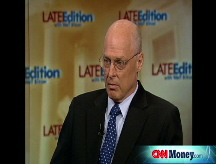Stocks stage late-day rally
Sinking oil prices help Wall Street erase earlier losses and end the day higher.




NEW YORK (CNNMoney.com) -- U.S. stocks staged a late-day rally Tuesday, with the Dow closing up 135 points, as falling oil prices overshadowed grim quarterly financial reports.
"A pullback in energy prices is going to be a beneficial move for consumer spending, corporate spending, and the macro economy," said Art Hogan, chief market strategist at Jefferies & Co.
At the end of the trading day, the 30-stock Dow Jones industrial average (INDU) was up 1.2%. The broader Standard & Poor's 500 (SPX) index gained nearly 1.4%. The tech-heavy Nasdaq composite (COMP), which sagged most of the day, ended the day almost 1.1% higher.
Stocks fell right at the open of the trading day in reaction to a slew of disappointing quarterly financial reports from Wachovia, USAirways, United Airlines' parent company UAL Corp. and shipping carrier UPS.
But by midmorning, crude oil prices plunged more than $5, leading all three major indexes higher as investors shifted attention away from corporate results.
"Oil prices are taking center stage, pulling investors' attention away from earnings," said David Levy, portfolio manager at Kenjol Capital Management.
Adding further support were comments by Treasury Secretary Henry Paulson urging Congress to back a plan to support troubled mortgage finance giants Fannie Mae and Freddie Mac.
In addition, the Federal Reserve Bank of Philadelphia President Charles Plosser, said the Fed may need to raise rates sooner rather than later to fend off inflation - a move seen as a boon to the dollar and stocks.
Market breadth was positive. On the New York Stock Exchange, advancers beat decliners by more than 2 to 1 on a market volume of 1.56 billion. On the Nasdaq, advancers also beat decliners by 2 to 1 on a market volume of 2.52 billion shares.
Oil prices: Oil prices fell Tuesday, closing at the lowest point since June 5, as a perceived decline in U.S. demand again took hold and worries subsided that a storm would disrupt production in the Gulf of Mexico. Light, sweet crude for August delivery, which plunged more than $5 in afternoon trading, settled down $3.09 to $127.95 a barrel. Starting Wednesday, the September contract will be actively traded. (Full story).
"The primary driver [for the stock market] is the big drop in oil prices," said Levy. However, a number of quarterly reports, "many of which were disappointing," said Levy, were keeping a damper on stock prices for most of the trading day.
"If you want to get a read on sentiment that has changed, it is the ability of energy prices to go down as much as they can go up," said Hogan. "To have a break in that trend is very significant," he added.
Corporate results: Washington Mutual (WM, Fortune 500) reported a $3.3 billion quarterly loss Tuesday - far worse than Wall Street was anticipating - as it set aside more money for bad loans. The Seattle-based thrift reported a net loss of $6.58 a share, which included a charge related to a $7 billion capital raise the company announced in April. Shares of Washington Mutual, however, gained 9% in after-hours trading on the news, after finishing the session more than 6% higher. (Full story).
Wachovia (WB, Fortune 500) posted a loss of nearly $9 billion for its second quarter Tuesday on losses related to home mortgages and the bank's declining market value. The shortfall exceeded the estimates of Wall Street analysts, but analysts said the bank's weakened condition may make it an attractive takeover candidate. As a result, shares of Wachovia ended the day up more than 27%. (Full story)
US Airways (LCC, Fortune 500) barely missed second-quarter revenue projections, but reported a smaller loss than expected. The No. 6 U.S. carrier reported a net loss of $101 million, or $1.11 per share. Shares of US Airways surged nearly 59% by the end of the day. (Full story).
United Airlines parent UAL (UAUA, Fortune 500) reported Tuesday a net loss of $2.7 billion for the second quarter, due largely to severance costs incurred by layoffs at the money-losing carrier. Shares of United ended the day nearly 69% higher after the company announced thousands of new job cuts.(Full story).
UPS (UPS, Fortune 500), the world's largest shipping carrier, said Tuesday its profit fell nearly 21% in the second quarter despite a 6.7% increase in sales. The company also lowered its outlook for the year amid a slumping U.S. economy. Shares of UPS gained more than 4%. (Full story)
American Express (AXP, Fortune 500) fell nearly 7% after posting a smaller-than-expected second-quarter profit and withdrawing its 2008 earnings guidance. (Full story).
Given the slew of grim earnings reports, "it is encouraging to see the market trade higher than was indicated pre-market based on those earnings," said Levy.
Comments by Paulson and Plosser: Investors also digested Treasury Secretary Henry Paulson's comments urging Congress to pass a bill supporting mortgage finance firms Fannie Mae (FNM, Fortune 500) and Freddie Mac (FRE, Fortune 500).
Speaking in New York Tuesday, Paulson said it's crucial that the companies have access to the capital they need to continue their operations and regain the public's confidence. (Full story).
Also, Philly Fed president Charles Plosser said inflation concerns may warrant a hike in the key federal funds rate, despite the economic slowdown.
Plosser said the Fed probably will need to boost interest rates "sooner rather than later" - even if employment and financial conditions haven't revived. Plosser is a voting member of the Federal Open Market Committee, the group including Fed Chairman Ben Bernanke that determines monetary policy, including interest rates. (Full story).
The hawkish comments from Plosser lent support to the market, according to one analyst.
"The stock market wants to hear that the Fed would take action to combat inflation and bolster the dollar," said Peter Cardillo, chief market economist at Avalon Partners. 'In that sense the rhetoric is positive, not negative."
Tech sector: The Nasdaq pulled into positive territory at the very end of the trading day on Tuesday, but the index was down most of the day. "The corporate news regarding the tech sector has not been good," said Cardillo.
"You have various household names that disappointed in the tech sector," said Hogan, including Apple and Texas Instruments, which dragged at the index throughout the day.
Computer and consumer electronics maker Apple (AAPL, Fortune 500) reported fiscal third-quarter earnings Monday that beat forecasts on strong sales of Mac computers and iPhones. But the company's outlook for the fourth quarter disappointed investors. Shares of Apple were down by almost 3%. (Full story).
Dallas-based semiconductor maker Texas Instruments (TXN, Fortune 500) reported higher second-quarter earnings, but the bottom line missed analysts' expectations. The company's shares were down almost 15% at the end of the day.
Web portal Yahoo (YHOO, Fortune 500) reported earnings and revenue that fell short of expectations. The Sunnyvale, Calif.-based company said quarterly net income fell 22% to $131 million, or 9 cents per share from $161 million, or 11 cents per share a year ago. Shares of the company fell more than 1% in regular trading. (Full story).
Other markets: In currency trading, the dollar was up against both the 15-nation euro and the Japanese yen.
In the bond market, Treasury prices sank, sending the yield for the 10-year benchmark note up to 4.10% from 4.03% late Monday. Bond prices and yields move in opposite directions.
COMEX gold for August delivery fell $15.20 to $948.50. ![]()





